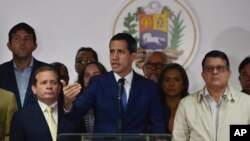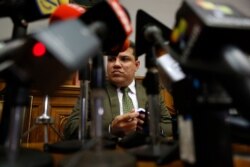Venezuelan opposition leader Juan Guaido and his new rival, lawmaker Luis Parra, called for competing legislative sessions Tuesday after both claimed to be the country's parliamentary speaker.
On Sunday, Venezuelan security forces with riot shields blocked Guaido from entering the National Assembly chamber where he was expected to be re-elected head of the opposition-dominated legislature. Instead, Parra, who is backed by socialist leader Nicolas Maduro, proclaimed himself speaker after claiming to have been elected with 81 votes in the 167-member chamber. Guaido has the support of much of the international community.
Opposition lawmakers later re-elected Guaido in a hastily arranged session at the headquarters of El Nacional newspaper, the last remaining newspaper in Caracas critical of Maduro and his ruling Socialist Party. A tally showed that 100 of Parliament's 167 legislators voted for Guaido.
Elliott Abrams, U.S. envoy for Venezuela, said Monday the U.S. is considering additional sanctions on Venezuela after what he called a "brutal and corrupt campaign" by Venezuela's government to deny lawmakers access to the National Assembly.
"Obviously if the regime had the votes, it would not have ordered soldiers to keep elected deputies out of the National Assembly," he told reporters at the State Department.
He said Guaido won the election with a proper quorum, and said the United States is looking at new ways to support him.
U.S. Secretary of State Mike Pompeo said in a statement Sunday that Venezuelan officials supporting Maduro are trying to "destroy the last democratic institution in Venezuela, the National Assembly." He described the session in which Parra claimed himself speaker as a "farcical vote,'" and said no quorum was present.
Guaido has led the opposition to Maduro since the National Assembly elected him speaker. In that role, he declared himself acting president on Jan. 23, 2019, after Parliament called Maduro a "usurper."
"We defeated the dictatorship again. We overwhelmingly defeated the dictatorship, the ambitions of the dictatorship," Guaido said Sunday after his supporters re-elected him.
The European Union said Sunday it would continue to recognize Guaido, while the Lima Group regional bloc said Monday it backed Guaido's re-election.
His re-election "represents a rejection of the reckless actions by Nicolas Maduro's regime that sought to prevent his appointment," said a statement by the group signed by Brazil, Canada, Chile, Colombia, Costa Rica, Guatemala, Honduras, Panama, Paraguay, Peru and Bolivia.
Argentina's new center-left government also criticized blocking Guaido from the National Assembly.
"To impede by force the functioning of the legislative assembly is to condemn oneself to international isolation," Argentina's Foreign Minister Felipe Sola said on Twitter.
Russia argued that the vote to elect Parr was a democratic action.
"We consider the election of the new leadership of Parliament to be the result of a legitimate democratic procedure," Russia's Foreign Ministry said in a statement.
Parra is one of several lawmakers who recently broke away from Guaido. He has since been expelled from his party for alleged involvement in a corruption scandal involving Maduro.
Guaido is recognized by the United States and nearly 60 other countries as the legitimate president of Venezuela.
Guaido's international backing rests on the fact that as assembly president, he is Venezuela's highest-ranking official to have been democratically elected.
Opposition lawmakers hold 112 seats in Venezuela's National Assembly.






